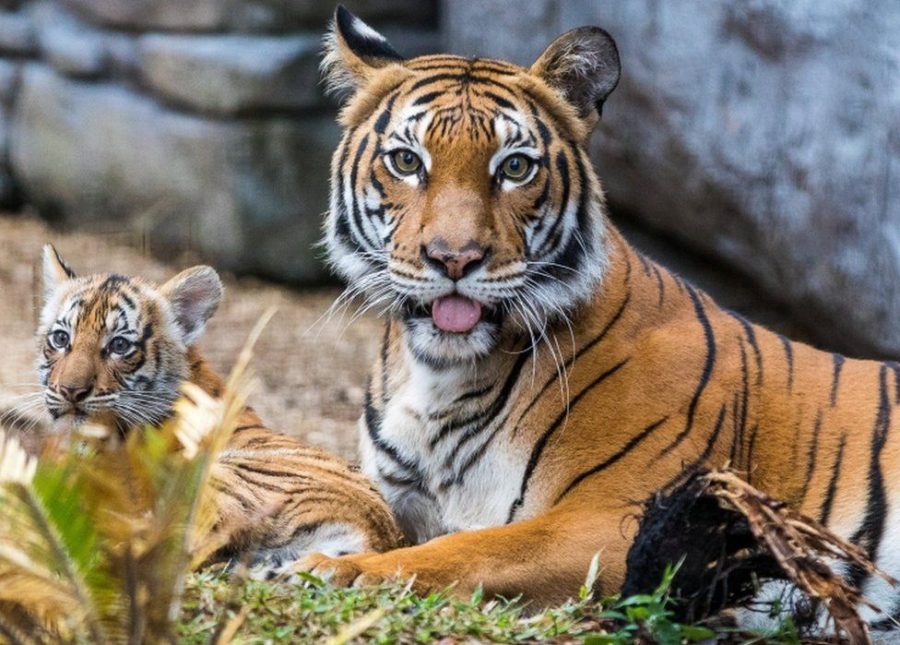Conservation Considerations
Are society’s wildlife preservation practices unethical?
Animals such as the tigers pictured tend to be favored by conservationists due to their humanistic physical features and family structure.
December 1, 2021
Wildlife assumes a high economic and cultural significance in our world today. While humans are no longer dependent on wild animals for survival, these exotic species have become a source of entertainment through tourism, zoos and circuses. As humans have changed their outlook on wildlife from a utilitarian view to a sympathetic view, billions of dollars have been raised in an effort to preserve it. These significant efforts have fostered a discussion about whether wildlife preservation is an ethical cause for donations.
Although the term “wildlife” means animals that are not bred or controlled by humans, most wildlife populations are no longer left untouched by humans. Since the 20th Century foundation of the national parks system and the passing of the Wilderness Act of 1964, nature is seen as pure, beautiful and special in Western society and preservation has become a priority for many activists. Many people think that it is humans’ duty to save the wildlife populations that human actions have destroyed through desertification, poaching, littering, pollution, etc. Wildlife preservation is done through lobbying for legislation, animal vaccinations, habitat conservation and more.
But, these wildlife preservation efforts can be seen as problematic, especially when it comes to foreign donations. Many organizations raise money from donors in the United States to spend on exotic animals in foreign continents like Africa, Antarctica or South America. For example, the World Wide Fund for Nature (WWF) raised over $276 million in 2020 alone, and most of the funding was directed to endangered species overseas, particularly in Africa.
Carter Roberts is the president and CEO of WWF, and in an interview with Harvard Business School News, he explained the complexity of these foreign preservation projects and alluded to why so much funding is necessary.
“We worked on creating vast systems of parks throughout Africa. But then you realize that unless the local communities have a stake in that – if they don’t own the wildlife, if they don’t have a share of the proceeds from people coming to see it, then poaching will occur. And so we created community—based programs where communities benefit from the parks and everything; but then you realize that unless you create national laws that that’s not going to last because as governments come and go, without a lasting legal framework the community’s rights aren’t going to be preserved. And then you realize unless you engage the biggest companies of the world who are sending market signals to purchase things from Africa, whether that’s minerals, or oil, or food, or whatever it happens to be, there will constantly be an outside pressure to destroy the places we cherish,” Roberts said.
The controversy surrounding the significant spending on foreign animals is due to a lack of effort to stop the suffering of more local animals. While hundreds of millions of American dollars are spent yearly on creating a safer habitat for giraffes and elephants in Africa, the animal suffering through due to the meat industry in America is widely overlooked. With just a fraction of the efforts dedicated to preserving foreign wildlife, legislation and ethical advancements could be made to help more local animal suffering.
American author, journalist and animal rights activist, Matthew Scully, explained the effect of American’s ignorance and lack of sympathy for animals that fall victim to factory farming in his book, Dominion: The Power of Man, the Suffering of Animals, and the Call to Mercy.
“Factory farming, like comparable evils throughout history, depends for its existence upon concealment. It depends on people either not noticing or willfully averting their gaze,” Scully said.
Animal activists like Scully claim that people overlook the animal suffering of livestock and common animals because of the human attraction to beauty. People tend to favor animals who are more “beautiful” and therefor donate more money to saving those animals. But what makes an animal beautiful to the eye of a human? While exotic colors and prints are attractive to humans, the key to animals’ beauty is humanistic qualities. Human-like features include a high forehead, expressive eyes and mammal traits. Humans are also fascinated by large, fierce, dangerous animals and sympathize more with family-oriented animals. This is important because “ugly animals” tend to be left aside when humans draw up conservation plans, causing humans to unintendedly attempt to beautify nature instead of conserve it.
While people are putting significantly more effort into saving foreign, exotic animals, through small acts such as vegetarianism, there has been a push for increased “ugly” animal advocation. Kaitlyn Metz (12) has been a vegetarian her whole life. She chooses to not consume meat because she dislikes the treatment that the livestock animals endure.
“I don’t like the suffering that cows, chickens and pigs go through. The meat industry does not think of them as sentient, and their treatment is inhumane,” Metz said. “If more people practiced vegetarianism, it would make a big financial difference for the companies, and they may finally let legislation through.”




